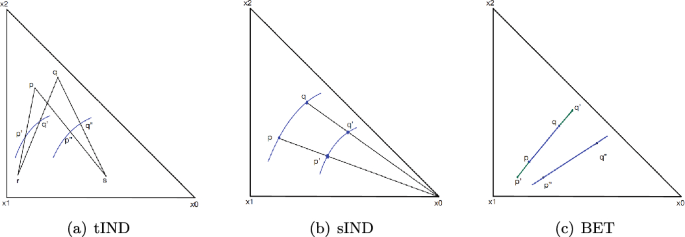预期效用、独立性和连续性
IF 0.9
4区 经济学
Q3 ECONOMICS
引用次数: 0
摘要
在本文中,我们通过适当调整独立性和连续性公理,提出了两个新的预期效用定理。我们的第一个定理利用弱版独立公理(混合权重变化)和新的弱连续性公理描述了预期效用偏好的特征。我们的第二个定理利用弱版独立公理(混合权重固定为 1/2)和强拓扑连续性公理描述了这些偏好的特征。我们提供了有用的例子来说明这些特征的严密性。本文章由计算机程序翻译,如有差异,请以英文原文为准。

Expected utility, independence, and continuity
In this paper, we provide two novel expected utility theorems by suitably adjusting the independence and continuity axioms. Our first theorem characterizes expected utility preferences using weak versions of the independence axiom (with varying mixture weights) and a new weak continuity axiom. Our second theorem characterizes these preferences using weaker versions of the independence axiom (with mixture weights fixed at 1/2) and a strong topological continuity axiom. We provide useful examples to illustrate the tightness of these characterizations.
求助全文
通过发布文献求助,成功后即可免费获取论文全文。
去求助
来源期刊

Theory and Decision
Multiple-
CiteScore
1.60
自引率
0.00%
发文量
62
期刊介绍:
The field of decision has been investigated from many sides. However, research programs relevant to decision making in psychology, management science, economics, the theory of games, statistics, operations research, artificial intelligence, cognitive science and analytical philosophy have remained separate. Theory and Decision is devoted to all aspects of decision making belonging to such programs, but addresses also possible cross-fertilizations between these disciplines which would represent effective advances in knowledge. The purpose of the journal is to let the engineering of choice gradually emerge both for individual and for collective decision making. Formalized treatments will be favoured, to the extent that they provide new insights into the issues raised and an appropriate modeling of the situation considered. Due to its growing importance, expermentation in decision making as well as its links to the cognitive sciences will be granted special attention by Theory and Decision.
Of particular interest are: Preference and belief modeling,
Experimental decision making under risk or under uncertainty,
Decision analysis, multicriteria decision modeling,
Game theory, negotiation theory, collective decision making, social choice,
Rationality, cognitive processes and interactive decision making,
Methodology of the decision sciences. Applications to various problems in management and organization science, economics and finance, computer-supported decision schemes, will be welcome as long as they bear on sufficiently general cases. Analysis of actual decision making processes are also relevant topics for the journal, whether pertaining to individual, collective or negotiatory approaches; to private decisions or public policies; to operations or to strategic choices.
Officially cited as: Theory Decis
 求助内容:
求助内容: 应助结果提醒方式:
应助结果提醒方式:


